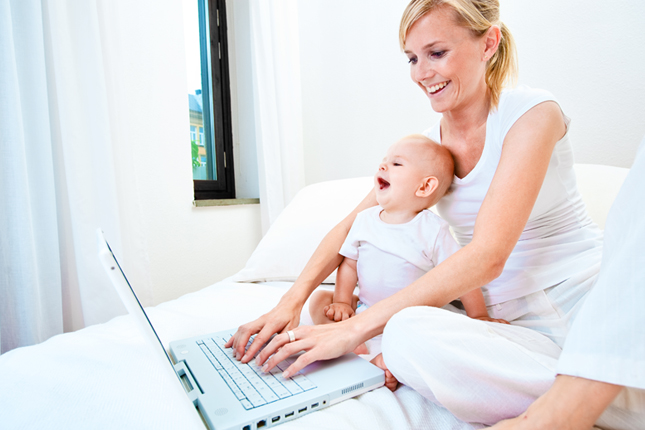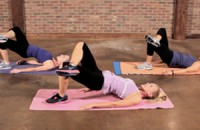The Boob Group
Breastfeeding Support Through Social Media
Please be advised, this transcription was performed from a company independent of New Mommy Media, LLC. As such, translation was required which may alter the accuracy of the transcription.
[00:00:00]
[Theme Music]
Robin Kaplan : Over the past decade, mothers have been seeking breastfeeding and parenting support online, from Yahoo and media groups to social media. Today, I'm thrilled to introduce Laura Audelo, a Certified Lactation Educator Counselor, owner of MamaPearDesigns.com and author of the new book, “Virtual Breastfeeding Cultures: Seeking Mother to Mother Support in the Digital Age”. This is The Boob Group, episode 57.
[Theme Music/Intro]
Robin Kaplan : Welcome to The Boob Group, broadcasting from the Birth Education Center of San Diego. The Boob Group is your weekly online, on the go support group for all things related to breastfeeding. I'm your host, Robin Kaplan, I'm also an International Board Certified Lactation Consultant, and owner of the San Diego Breastfeeding Center. Thanks to all of our loyal listeners who have joined The Boob Group Club. Our members get all of our archived episodes, bonus content after each new show, plus special giveaways and discounts. Subscribe to our monthly newsletter for a chance to win a membership to our club each month. Another way for you to stay connected is by downloading our free app, available in the Android and iTunes marketplaces. In our studio today we have two lovely panelists. Ladies, will you please introduce yourselves?
Christina Williams : My name is Christina Williams, I am 34 years old, I am a medical education. I have one daughter, she is 16 months.
Ashlee Eagal : I am Ashlee, I am 24 years old. I am a stay at home mom to two children, Aaden is three and Averlee is two months.
Robin Kaplan : And Averlee is in the studio here today, so if you hear any sweet little quacks, it's just her, just getting her mother's attention. Thanks ladies, we're so happy to have you in the studio today.
[Theme Music] [Featured Segment: Lose the Baby Weight]
[00:02:13]
Autumn Bonner : Hi Boob Group! My name is Autumn Bonner, I'm the co-owner and founder of Tailored Fitness, an online video-based workout program for moms. I'm here today to give you some tips on exercising after having your baby. Did you know that caring for a newborn can wreak havoc on your posture? The weight of your breasts, leaning over while nursing and changing diapers and carrying your baby in cradle hold, all cause your shoulders to hunch forward. This makes you chest muscles tight, while the muscles in your middle and upper back grow weak. Luckly, regular exercise can help you get your posture back. Good posture instantly makes you appear slimmer and feel more confident. To strenghten the muscles in your back, try this exercise: with your arms straight out in front of you, spaced about shoulder with a part, hold a resistance band with both hands. Keeping your arms straight, pull your hands apart, stretching the band and bringing your shoulder blades together in the back. Keep going, until your arms are straight out to your sides. Return slowly to the starting position, and repeat two sets of ten. To stretch your chest muscles, open your arms wide to a T position, and hold for 30 seconds. To learn more great exercises, created just for new moms, check out our videos at MyTailoredFitness.com. And keep tuning in to The Boob Group for more great tips on exercising postpartum.
[Theme Music]
[00:03:38]
Robin Kaplan : Today on The Boob Group we are discussing how to find breastfeeding support through social media. Our expert, Laura Audelo, is a Certified Lactation Educator Counselor, the owner of Mama Pear Designs, a frequent expert on The Boob Group with our featured segments, and the author of a brand new book, called “Virtual Breastfeeding Cultures: Seeking Mother to Mother Support in the Digital Age”, that discusses this new trend of seeking breastfeeding support online. Thanks so much for joining us, Laura, and welcome to the show!
Laura Audelo : Thank you!
Robin Kaplan : Laura, what inspired you to write this book?
Laura Audelo : My journey into the online breastfeeding support began in 2007. I was a first time mother, I found myself in need of breastfeeding support. I had just moved to San Diego, from Florida, so I was 3,000 miles away from home, and I went online because it was convenient, and I was constantly searching for information there. And I found what I needed quite quickly. And getting in touch with other mothers was quite fun. At the time I was using the La Leche League International Mother to Mother Forum, so there was always somebody online to help me, and that to me was very reassuring.
Robin Kaplan : Very cool. Would you say that this was what really inspired you and started this personal experience?
Laura Audelo : I would, because up until this time I wasn't spending any time online, except to email friends and family and whatnot. This really got me into the community, so to speak. Becoming part of that and then being inside of it, and realizing how big and wonderful it was, it's kind of what five years, six years later gave me the idea to write this.
Robin Kaplan : Having read your book, I noticed that most of the content in there is actually stories submitted from other mothers. How many mothers submitted stories to your book?
Laura Audelo : Over 300 mothers offered their stories. And there are 30 stories contained in the book.
Robin Kaplan : And why did you want to share these stories in book form? Rather than online?
Laura Audelo : Because I wanted to highlight in a complete volume the incredible range of support that we can find online as breastfeeding mothers. And I knew if the story was presented as narrative, in a mothers' words, they would be much more moving and inspirational than me just recounting them or telling people where they can go to find these places of support. I had no idea what kind of stories I would get when I cast my net, I didn't know if I would get ten stories, maybe all on the same topic, or a bunch of different accumulated stories. But once I had everything, I sat down to find the similarities, and grouping them, and it all just kind of came together that way.
Robin Kaplan : What would you say is kind of the overarching theme of why these mothers in your book searched for breastfeeding support online?
Laura Audelo : Because they clearly weren't finding what they needed in their real life, to answer every question. Someone in the book, as you will find, are facing struggles that are just kind of extremely personal. For instance, like in the bfar chapter of the breastfeeding, after reduction chapter. Not a lot of women are comfortable talking about their history of breast surgery. Or some of these moms have stories that are so isolating, like the mothers who lost their babies. Thankfully, there are a lot of us who can relate to that, so they ended up turning online to find the support that they needed.
Robin Kaplan : I'd love to open this interview now, through our panelists. Starting with you, Christina, have you sought online support for breastfeeding and parenting advice?
Christina Williams : Absolutely.
Robin Kaplan : And what kind of inspired you to search online rather than just in person?
Christina Williams : Well, I did in person as well, but online was great, because I was up a lot in the middle of the night, and a lot of other moms were up in the middle of the night, and could connect with me at that time. So a lot of hours sitting in there, searching the internet while I'm up breastfeeding.
Robin Kaplan : It's so funny, when I was searching online on the pages, everyone is writing stuff at 2 o'clock in the morning, five o'clock in the morning, and, like you said, that's not exactly a time where if you picked up the phone and called your best friend, she'd be super excited to talk to you. How about you, Ashlee?
Ashlee Eagal : I started looking for support online because most of the friends that I had in the area were not parents. So it was a lot easier for me to go online and connect with people that I wouldn't otherwise get to meet. I also kind of stumbled onto it by accident, looking for other things online, and just found a whole community of moms online.
Robin Kaplan : I think community is such a great word. Because there is such a difference between just googling “sore nipples” and connecting through social media, talking about sore nipples, because you are creating a conversation. Would you say that you're finding the same thing, Laura?
Laura Audelo : Absolutely. And one of the things that happens to all of us is that we go looking for – for instance – the answer to why are my nipples sore, and we stay because they will listen to us, complain or rejoice about any other thing in our lives. So what brings us together is breastfeeding, and what keeps us together is friendship.
Robin Kaplan : Absolutely. Laura, where did you find that most mothers who submitted stories to your book, where were they finding breastfeeding support online?
Laura Audelo : Many of the moms are obviously on Facebook, kind of like as we all are. They are either in private Facebook groups, which is great, because then you can ask your questions and they don't show up on your wall, or if you need to complain about someone in your family being unsupportive, no one can see that. But they are also following pages like Tell Mom, or The Leaky Boob, both of them are very popular. Others are really tuned in to Twitter, and they're chatting to the professionals and moms, who have walked a mile in their shoes and are willing to share their knowledge in that quick format.
Robin Kaplan : Christina, where did you find the most helpful breastfeeding resources when searching online?
Christina Williams : I think the best support that I got was actually from a group that was not for breastfeeding, it was a group of moms who got together after pregnancy loss, and then after we had our babies after that loss, that group came from that. So all of us had our babies about one or two months, and it was really nice, because we were up in the same time, with the exact same challenges, and we connect everyday still, and its been 16 months.
Robin Kaplan : Oh my goodness, and would you say that that's where you made the most connections, within this group?
Christina Williams : Yes, absolutely.
Robin Kaplan : How about you, Ashlee?
Ashlee Eagal : I pretty much go to Youtube a lot, there are so many mommies out there that are really fun to watch. And you can watch them from the beginning of their pregnancy and finding out that they are pregnant, all the way through weaning and beyond, and it's really fun to watch their journey. And it's also extra fun when you're watching it and you're going through it at the same time.
Robin Kaplan : Absolutely. You know what, I had never even thought about going to Youtube for that type of making connections, but that makes so much sense, because you actually get to put the face to the name as well. Do you use Facebook as well for these type of connections too?
Ashlee Eagal : I do use Facebook, a lot of blogs that I follow also have Facebook pages, so I thought to go on there, and then a lot of the moms who have channels also have Facebook pages, so I use it there. And I think it's called the National Parenting Network that I follow on Facebook as well.
Robin Kaplan : It's so funny, I feel so outdated. I should mention that I'm on Laura's book as well, which is super fun, but talking about my experience with using online support, and granted this was a couple more years ago, and it wasn't for breastfeeding, it was for parenting. But just having that support, we were dealing with some sensory issues with my son, and no one in our family, none of our friends had ever seen it or maybe their kids have it, but they haven't been identified yet, and so I felt like it was just this uphill battle, and I didn't have the type of support I needed. So I started doing Yahoo groups, and just the conversations that came out of that. And now they all have Facebook pages as well. But it was amazing, 'cause it was like this little part of my life that I wouldn't have found support for otherwise, if I hadn't been online. I know a lot of moms feel that way about breastfeeding as well as other parenting things. Well, Laura, we will be right back, we're going to continue this conversation with her, talking about why mothers are finding online support so crucial during their breastfeeding journey. We'll be right back.
[Theme Music]
[00:12:15]
Robin Kaplan : Alright, welcome back, we are here with Laura Audelo, talking about how to find breastfeeding support through social media, how moms are using this to really find a community for breastfeeding, as well as for parenting. Laura, does the support differ for mothers between Twitter, Facebook pages, Facebook private groups, Pinterest, Youtube, all that kind of stuff?
Laura Audelo : I think it does. It does and it doesn't. The great thing about all these different social media platforms is that they each can reach a different personality type. Some women love the fast pace of Twitter, others are inspired by the images they can collect on Pinterest, and make their own board and then go back and refer to, and then we still have the groups of moms that love the interaction that Facebook allows. As your panelist said, she goes on Youtube, which I think might even kind of highlight generational differences between our generation, Robin, and the millennials, because they are used to more visual, as technology has grown along with them. It does differ, but there is something for every personality, which I think is so wonderful.
Robin Kaplan : To the moms in your book, did you find that there was one particular platform that they were using? Or were they different ones?
Laura Audelo : I would say that Twitter and Facebook were probably neck in neck. Maybe Facebook had a little bit of an edge. But those were the two most common, for sure.
Robin Kaplan : Did any of these mothers said that they received any criticism while posting questions and advice on these online forums?
Laura Audelo : They didn't really discuss it. And I think there is a reason for that. They face criticism in their real lives, which is why they went online, to find the exceptions that they were needing and craving. They also learned that online, you can take what you need and leave the rest. It's much easier to walk away from your computer, or put your smartphone down, when something doesn't seem to feel or fit right, than it is to walk away from your mother in law when she's visiting you while you're breastfeeding for the 16th time today. So, unacceptance online? Sure there is, but we typically don't stick around for that, because we know we don't have to stay. And we know that there is acceptance in another URL.
Robin Kaplan : It's interesting, we have this great online private Facebook group here in San Diego, and I think for the first time that I had noticed in months and months, there was a little bit of an argument going on, on the Facebook group. And one mom got really really upset, and she said that she was no longer going to part of that group, and I think the one thing, although I was actually quite shocked to see the amount of criticism that was coming out, but then she also had a whole other group of women saying that this criticism needs to stop. She had her own little cheering squad too, I think that makes the big difference, as well as, like you were saying with your mother in law asking you, “Why are you breastfeeding 16 times in a 24 hours period”, if you don't have someone else in the room who is going to get your back, you can feel very very isolated and uncomfortable. And while that isolation and un comfortability, you are still going to feel when it's online, you are still going to have the opportunity to have some cheerleaders behind you as well. And like you said, hopefully, you have the courage to just walk away, and know that these people actually don't even really know you sometimes, either. Anonymity also allows you to post things that maybe you wouldn't say to someone to their face, which can be a little bit of a challenge as well online. Laura, why do you think that these online connections are so crucial?
Laura Audelo : I think first and foremost, motherhood. Especially in early days, it can be extremely isolating. And working women – 66% of mothers work at home – so working women get very little maternal leave, their partners often get little to none, and then transition to motherhood can be really really hard. We're vulnerable, and it's OK if it's something that we need to be aware of. But as such, we need to have groups of people who can support us through these most incredible changes and transitions that we're going to undergo. Motherhood changes everything about us, and we can't even pretend that that part of it doesn't exist, but the online support that we can find, support they don't often have in their real lives, provides the cushion that we need to get through this time. And I think that's why these online connections are so crucial for so many women.
Robin Kaplan : Absolutely. Christina, how significant has this online support been for you during your breastfeeding journey?
Christina Williams : Oh, huge! I think in person it can be a little bit difficult. You see somebody, and they're breastfeeding, and you don't want to walk up and say, “I noticed you're breastfeeding, and my nipples hurt, do you have this problem?” And I think it's great. You can be as anonymous as you want to be. I looked at different groups for different kinds of support, and not for evidence based support, I looked for the mom forum. If I want natural resources, I look for the baby wearing community, if I want to just connect with somebody, I look to my private Facebook groups, where I've built friendships.
Robin Kaplan : Absolutely. How about you, Ashlee? How important have they been to you?
Ashlee Eagal : Well, I did not know about all the different online support that was available when I was breastfeeding my son, and I found it in transition of getting pregnant with her, and everything like that. So, when going into this breastfeeding with her, I felt much more confident, and I'm doing things with her that I never did with him, and it's just been much more succesful. Like I never breastfed in public with my son, ever, not a single time. I always pumped before we left the house, and we would go home as soon as he ate, because I didn't want to run into him being hungry again. It was even to the extend of we would go to Disneyland – I'd pump on the way there, and then we'd leave when we were out of feedings for him for the day. And with her, I was walking around the zoo a couple of weekends ago, just looking at exhibits and feeding her, everything like that.
Robin Kaplan : And how do you think that these groups helped you overcome that fear of breastfeeding in public?
Ashlee Eagal : They really kind of normalized breastfeeding for me. A lot of my friends, when they had children, they didn't breastfeed, or they didn't breastfeed for very long, and it made it feel more normal, and more people were doing it, so I was more comfortable. As silly as that sounds...
Robin Kaplan : … It's not silly at all, no, not at all. That's fantastic, I think we talk a lot about normalizing breastfeeding, and the more women we see breastfeeding in public, the more other women will be inspired, and feel confident to do it as well. I think it's fantastic that you actually found that online, and that translated into your everyday life. That's not silly at all, that's wonderful. Christina, anything in particular that it really helps you with as well, confidence?
Christina Williams : Definitely confidence. I think the in person groups – I went to Robin Support Group, and that was great, but then the everyday connection with people, and seeing things, and being able to see how people manage their breastfeeding in public issues – I just think that helped a lot, just the consistency, normalizing it, making it part of everyday life versus once a week I go to this group and I can just breastfeed.
Robin Kaplan : That's a great point, I never even thought about that. But a lot of the women who come to the group – they are only seeing each other once a week, so you save up all your questions and you want to ask them there when you're there in person, but that online continuity – we talked about it as practitioners, continuity of care, and you guys are getting continuity of care through your community. That's wonderful. I love this topic so much! Laura, what are some common themes that you saw on the stories you received?
Laura Audelo : The one theme – and it was surprising to me, because I expected to find it, but not to the extent that I did – was depression. And for some moms, it was furious, and other moms not as intense. But it really opened my eyes to the support that we need to offer one another. I always felt aware before, I didn't experience postpartum depression with either of my pregnancies, but I feel really aware now. And if there is one thing that I hope women take away from this book, it's that we have to look out for our sisters, because we can recognize the signs often earlier than others, whether we're online or in real life, whether we're making these connections virtually or face to face, and it's very important that we are aware of each other in this critical time period, after our babies are born.
Robin Kaplan : Did you find that the women who were describing this depression that they were feeling afterwords, do you think that they... if they ended up seeking help, they may have done it sooner, because someone else caught it?
Laura Audelo : I think so, and I think that even some of them didn't have the resources to seek professional help, which is unfortunate, however, their online community provided them more support that they would have probably ever gotten face to face. We already discussed earlier, it's easier to say something, almost sometimes to strange – not strangers, but no one can see you break down and cry, they can't see you crying as you're typing, it's easier to get it out, and I think that these women who couldn't get to the professional support, they really were saved by their online communities.
Robin Kaplan : I think the difference too is one thing Christina mentioned, that you can post it anytime of the day, and definitely those witching hour times, are definitely the times where I know I was breaking down on a daily basis. Those are times that would have been really helpful getting online and just... almost like a check-in, helping to normalize it, and having that support and those cheerleaders behind. But as well as just being, like you said, being able to type when you're crying. Think about it, if you were waiting for your partner to get home, or you were waiting for your best friend to get home from work, and you're just sitting in there in a solemn place. But you can get online and post something, and someone most likely will post something right back to your comment within five minutes, if not even less. It's like that immediate support to kind of take you off that ledge and help you start feeling better, and talking it out, having that conversation.
Laura Audelo : Absolutely.
Robin Kaplan : Laura, what are your favorite resources for online breastfeeding support? Do you have a couple that you prefer? Or you just absolutely love, I should say?
Laura Audelo : Yeah, I do. I love KellyMom, and I have been a huge fan of her site since 2007, when I first discovered it. And I love the fact that her site is evidence based information, she is a professional, it's no thrills, there is no distracting adds, it's very easy to find what you need, and it's full of information. And it's constantly growing. I also love BreastfeedingMadeSimple, Dr. Jack Newman's site, because he has a lot of videos, which are very helpful. And of course, the most popular breastfeeding pages on Facebook, Best for Babes, Leaky Boob, the ones that women are constantly asking questions. There are a lot, there are almost too many to name, which is one of the reasons why I made sure that we gave a good resources section at the back of the book.
Robin Kaplan : And it's constantly growing too, even KellyMom, in just over the last couple of months has switched over from her Facebook page to the private forum. Is it private?
Laura Audelo : There are groups that you have to be approved, it's not hard to get approved, but it's not open to everyone. You can ask a personal question without having everyone read them on your wall.
Robin Kaplan : Absolutely. Ashlee, what are your favorite online resources, you have mentioned Youtube, what else?
Ashlee Eagal : Well, I also going to KellyMom and Leaky Boob, I really enjoy those. From Youtube, really just like specific channels, where the moms are really honest.
Robin Kaplan : How did you find those?
Ashlee Eagal : I stumbled upon them when I was looking for information about cloth diapers, and someone had mentioned in one of the blogs about the Cloth Diaper channel on Youtube, and then, from there, to the moms who post on there, have their own little channels, and it kind of just branched out to this thing.
Robin Kaplan : Breastfeeding stuff.
Ashlee Eagal : Yeah.
Robin Kaplan : Fantastic. How about you, Christina?
Christina Williams : KellyMom for sure, the private Facebook group is awesome, I can post all those questions and no one on my Facebook feed sees them. And that one was more helpful for me when my daughter was just a little minnie, 'cause there were a lot of kind of early questions in there, and now that she is an exuberant toddler, I find more helpful information from mommy blogs. I got connected to the moms I've met who had pregnancy loss through the bump, and there are a lot of forums there, and then we broke off and made our own private Facebook groups. There are a lot of local groups on Facebook, here there is San Diego Breastfeeding, there are a lot of baby wearing groups that are local, and I just participate in all of those across the board. You can find a lot in your neighborhood if you look on Facebook. Facebook is online, but it's also your community.
Robin Kaplan : Absolutely. We have had a – I think it's Nevada breastfeeds – we have had them on a while ago when we first started, and the same type of thing, she was starting this online community where they were all talking about breastfeeding. I think that's a really good point, that it doesn't have to necessarily be national or international, but you may even find some very small ones that will help connect you to moms in your community, so not only can you talk with them online, but you could actually go get lunch with them, at some point, as well. OK, well, thank you so much, Laura, for sharing this fantastic insight into finding breastfeeding support through social media, and to our panelists, for sharing their experiences with it as well. And for our Boob Group Club members, our conversation will continue at the end of this show, as Laura will share her top three tips for maximizing your breastfeeding support system, using social media. For more information about our Boob Group Club, please visit our website, at TheBoobGroup.com.
[Theme Music] [Featured Segments: From our listeners]
[00:26:35]
Robin Kaplan : Here's a comment from one of our Facebook friends, this is from Shelley, and what she wrote was, “I posted this on the Leaky Boob as well, but with all the negative stories we've been hearing lately about nursing in public, I thought I'd share the wonderful breastfeeding encouragement I had a couple of weekends ago, from my 85 year old great uncle. At Easter lunch, he asked me if I was still breastfeeding my three month old, and I told him I was. He said, Good, 'cause that's the best thing you could do for that baby. He then told me about his first cousin, who, when they were in school, would use to come home from lunch, just so he could nurse”. Thank you for sharing that story with us, Shelley, I am smiling as I am reading it.
[Theme Music]
Robin Kaplan : This wraps up our show for today, we appreciate you listening to The Boob Group. Don't forget to check out our sister shows, Preggie Pals, for expecting parents, and our other show, Parent Savers, for moms and dads with newborns, infants and toddlers. Thans for listening to The Boob Group, your judgement free breastfeeding resources.
[Disclaimer]
This has been a New Mommy Media production. Information and material contained in this episode are presented for educational purposes only. Statements and opinions expressed in this episode are not necessarily those of New Mommy Media and should not be considered facts. Though information in which areas are related to be accurate, it is not intended to replace or substitute for professional, Medical or advisor care and should not be used for diagnosing or treating health care problem or disease or prescribing any medications. If you have questions or concerns regarding your physical or mental health or the health of your baby, please seek assistance from a qualified health care provider.
[00:28:17]
[End Of Audio]











